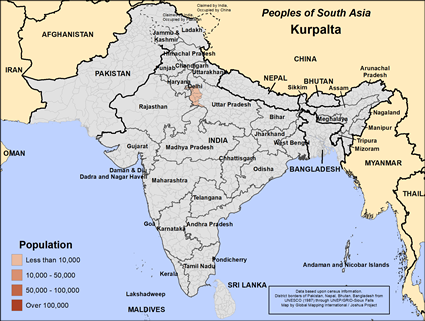The Hindu Kurpalta people live in western Uttar Pradesh, India. Historically, they have relied on agriculture as their primary means of livelihood. Over time, the Kurpalta have adapted to modern agricultural techniques while still holding on to some traditional practices. Their community has remained closely tied to the land, with farming continuing to be the backbone of their economy. Some Kurpalta families have diversified into small businesses and labor in nearby towns, but most still rely on farming.
Most Kurpalta families work in agriculture, cultivating crops such as wheat, rice, sugarcane, and vegetables. Farming is central to their way of life, with both men and women contributing to the work in the fields. The community follows seasonal cycles, planting during the monsoon and harvesting during the dry season. In addition to farming, some families keep livestock, including cattle and goats, which provide additional income and food.
Kurpalta villages are typically organized around extended families, with homes built from locally available materials like brick and mud. Life in these villages revolves around work, family, and community events. Some members of the community have sought employment in nearby towns and cities, but the majority remain in rural areas, working the land. The village environment fosters close-knit relationships, with family and community cooperation playing a crucial role in daily life.
The Kurpalta people practice Hinduism and observe various religious festivals, such as Diwali, Holi, and Makar Sankranti. They worship deities like Vishnu, Shiva and local gods connected to agriculture and nature. Temples serve as focal points for worship and social gatherings, and many families also maintain small shrines in their homes.
Their religious practices are closely tied to the agricultural calendar, with prayers and rituals offered for a good harvest, rain and the protection of livestock. Festivals and religious ceremonies provide opportunities for the community to come together and celebrate, reinforcing the role of religion in their daily lives.
The Kurpalta people face several challenges, especially related to economic development, education and healthcare. Many families still use traditional farming methods, leaving them vulnerable to changes in climate and environmental conditions. Droughts and irregular rainfall can severely impact crop yields. Access to modern irrigation systems, agricultural tools, and sustainable farming practices would greatly benefit their agricultural efforts.
Education is also a significant need in Kurpalta villages. While some children attend local schools, many do not have access to quality education, limiting their opportunities for advancement. Expanding educational resources and improving the quality of schools would help the younger generation build a better future.
Healthcare services are limited, with many families relying on traditional remedies or traveling to distant towns for medical care. Programs aimed at improving healthcare access and providing more consistent medical services would address an urgent need in the community.
Pray for workers to go to the Kurpalta people, and for their hearts to be ready to receive their savior.
Pray for networks of believing families and fellowships that will throw the doors open for others to follow Jesus.
Pray for the Lord to bless the families among the Kurpalta people with his presence and mercy.
Pray for believers among this people group to disciple others who will disciple still others.
Pray for Bible believing fellowships and churches among the Kurpalta people.
Scripture Prayers for the Kurpalta in India.
Ethnologue: Languages of the World
Reports from Indian NGOs on rural communities in Uttar Pradesh
Academic research on agricultural practices in northern India
| Profile Source: Joshua Project |











